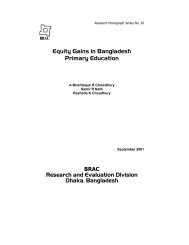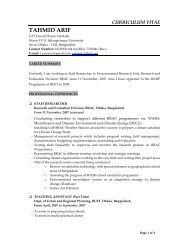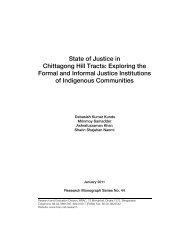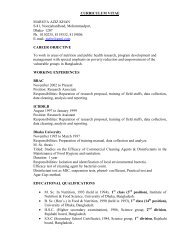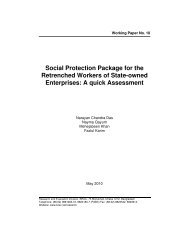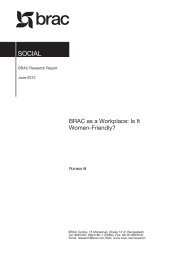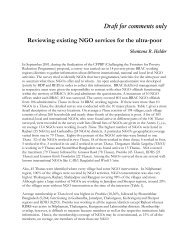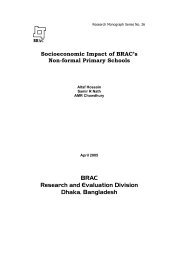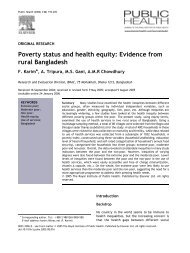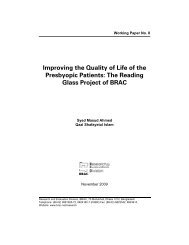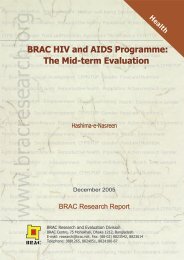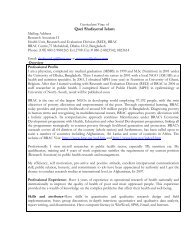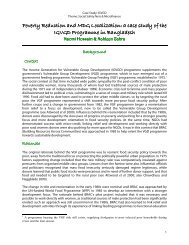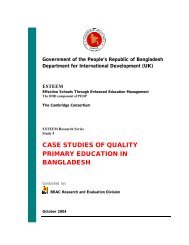Combining health and social protection measures to reach the ultra ...
Combining health and social protection measures to reach the ultra ...
Combining health and social protection measures to reach the ultra ...
Create successful ePaper yourself
Turn your PDF publications into a flip-book with our unique Google optimized e-Paper software.
Innovation<br />
capacities. It is indeed weak <strong>health</strong> care systems that prevent<br />
high vaccination coverage <strong>and</strong> <strong>the</strong> reduction of maternal<br />
mortality. Effective innovative skills are necessary <strong>to</strong> bring<br />
about <strong>the</strong> creation of <strong>health</strong> care systems that are closer <strong>and</strong><br />
accessible <strong>to</strong> <strong>the</strong> client.<br />
In addition, effective ways of disseminating knowledge for<br />
behavioural change requires research capacities for support.<br />
To accelerate <strong>the</strong> pace of current achievements, create greater<br />
certainty that new knowledge becomes a public good<br />
accessible <strong>to</strong> all, <strong>and</strong> ensure that new <strong>and</strong> improved <strong>to</strong>ols are<br />
utilized effectively by those that need <strong>the</strong>m most, we must<br />
encourage real partnership in <strong>the</strong> process of knowledge<br />
generation. This can be <strong>the</strong> case only if deliberate efforts are<br />
made <strong>to</strong> support research capacity development in diseaseendemic<br />
countries.<br />
Achieving <strong>the</strong> Millennium Development Goals should go<br />
h<strong>and</strong> in h<strong>and</strong> with developing capacities <strong>to</strong> sustain<br />
achievements <strong>and</strong> make even greater progress in future.<br />
Health <strong>and</strong> development are achievable. They must be<br />
linked <strong>to</strong> <strong>the</strong> capacity <strong>to</strong> generate <strong>and</strong> utilize effectively<br />
generated knowledge 9 . The role of research in being<br />
<strong>health</strong>y is unquestionable. Hence, capacity for research<br />
<strong>and</strong> development is a prerequisite for empowering<br />
countries <strong>to</strong> participate actively in solving <strong>the</strong>ir priority<br />
problems, <strong>and</strong> contribute effectively <strong>to</strong> making a <strong>health</strong>y<br />
global community. ❏<br />
Andrew Y Kitua is a medical doc<strong>to</strong>r <strong>and</strong> epidemiologist. He is<br />
currently Direc<strong>to</strong>r General of <strong>the</strong> National Institute for Medical<br />
Research in Tanzania. Dr Kitua was previously Direc<strong>to</strong>r of <strong>the</strong><br />
Ifakara Health Research <strong>and</strong> Development Centre from 1993 <strong>to</strong><br />
1997. He has vast experience in <strong>health</strong> research <strong>and</strong> public<br />
<strong>health</strong>, especially in malaria epidemiology, vaccine <strong>and</strong> clinical<br />
trials <strong>and</strong> <strong>health</strong> systems. He is a member of <strong>the</strong> TDR Technical<br />
Advisory Committee, <strong>the</strong> Ne<strong>the</strong>rl<strong>and</strong>s (WOTRO); Developing<br />
Countries Coordinating Committee of EDCTP; member of <strong>the</strong><br />
Board of Direc<strong>to</strong>rs of three research institutions in Tanzania.<br />
Initia<strong>to</strong>r <strong>and</strong> Secretary, Tanzanian National Health Research Forum<br />
(TANHER Forum) <strong>and</strong> Chairperson of <strong>the</strong> Tanzanian National<br />
Malaria Advisory Committee.<br />
References<br />
1.<br />
The World Health Report 2002 – Reducing risks, promoting <strong>health</strong>y life,<br />
Geneva, World Health Organization, 2002.<br />
2.<br />
The World Health Report 2003 – Shaping <strong>the</strong> future. Neglected Global<br />
Epidemics: three growing threats. Geneva, World Health Organization,<br />
2003.<br />
3.<br />
Report of <strong>the</strong> Working Group 5 of <strong>the</strong> Commission on Macroeconomics<br />
<strong>and</strong> Health 2002. Improving <strong>health</strong> outcomes of <strong>the</strong> poor. World Health<br />
Organization, Geneva, 2002.<br />
4.<br />
Report of <strong>the</strong> Commission on Macroeconomics <strong>and</strong> Health. 2001.<br />
Macroeconomics <strong>and</strong> Health: Investing in <strong>health</strong> for economical<br />
development. World Health Organization, Geneva, 2001.<br />
5.<br />
Bazin H. The eradication of smallpox: Edward Jenner <strong>and</strong> <strong>the</strong> first <strong>and</strong><br />
only eradication of a human infectious disease, 2000. Academic Press.<br />
6.<br />
One disease down – Eradication of river blindness offers hope in fight<br />
against AIDS. Sarasota Herald Tribune. 13 December 2002.<br />
7.<br />
Onchocerchiasis elimination program for <strong>the</strong> Americas (OEPA). Updates:<br />
2005 www.cartercentre.org<br />
8.<br />
Ma<strong>to</strong>la YG <strong>and</strong> Magayuka SA. Malaria in <strong>the</strong> Pare area of Tanzania: V.<br />
malaria 20 years after <strong>the</strong> end of residual spraying. Transactions of <strong>the</strong><br />
Royal Society of Tropical Medicine <strong>and</strong> Hygiene 75, 1981, 811-813.<br />
9.<br />
Kitua AY. Building capacity for public <strong>health</strong> research. Global Forum<br />
Updates on Research for Health, 2005, pp. 037-040.<br />
Global Forum Update on Research for Health Volume 4 ✜ 103



